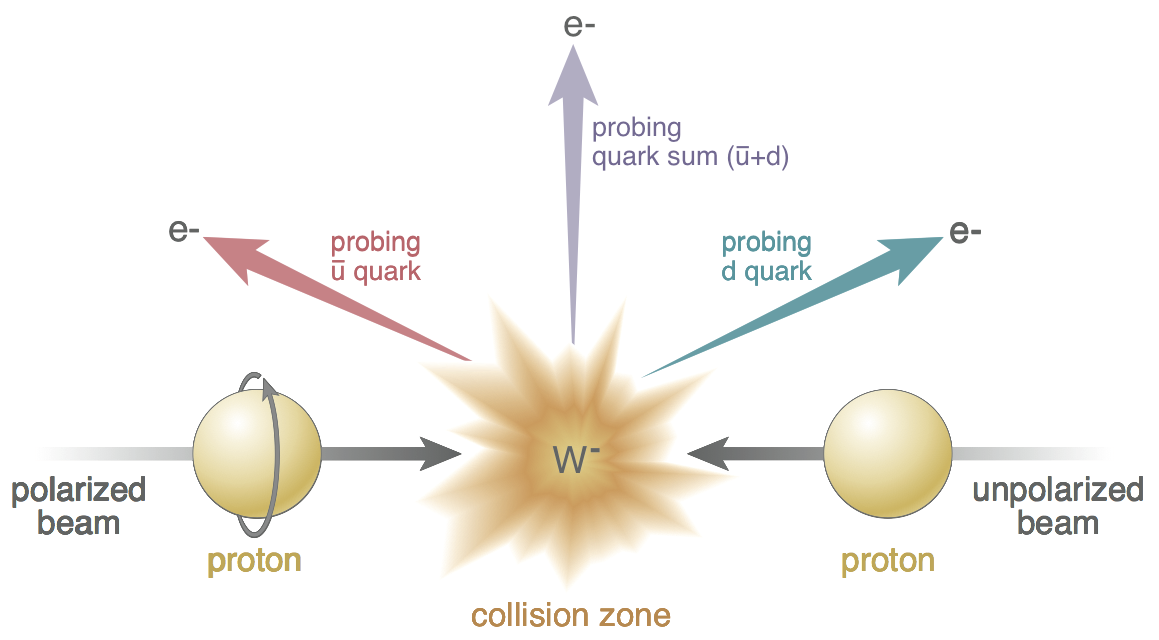W/Z 2013 Analysis

- EVO Booking
- Mailing list
- Weekly Meetings: Monday, 10:00AM-11:00AM / Agenda posted on STAR Events
Final Run Lists:
L2BW: p14iaL2BW Luminosity : 125.7pb-1
L2EW: P14iaL2EW Luminosity : 118.9pb-1
Data :
Location :
L2BW : L2EW :
Total # of MuDst files :
L2BW : L2EW :
Total # of Events :
L2BW : L2EW :
Disk space :
MC :
Location : /star/data19/wEmbedding2013/
Wplus_enu :
Wminus_enu:
Wplus_tau:
Wminus_tau:
Z_enu:
Asymmetry
BEMC calibration
Background
Cross-section
EEMC calibration
ESMD calibration
MC simulation
Polarization Run 13
Preliminary results
1. DIS2017 (Barrel + Endcap) by Qinghua, Slides and Preceedings
2. SPIN2016 (Barrel) by Devika, Slides and Preceedings
3. INPC2016 (Barrel) by Jinlong, Slides and Preceedings
Production
Projections
Publications
Reconstruction / Code
Relative luminosity
Run 2013 W AL Paper Proposal Webpage
Title:
in polarized proton-proton collisions at √s = 510 GeV
PAs:
Devika Gunarathne, Amani Kraishan, Ernst Sichtermann, Bernd Surrow, Qinghua Xu, and Jinlong Zhang
Proposed Target Journal:
Physical Review D Rapid Communications
Abstract:
We report new STAR measurements of the single-spin asymmetries $A_L$ for $W^+$ and $W^-$ bosons produced in polarized proton--proton collisions at $\sqrt{s}$ = 510\,GeV as a function of the decay-positron and decay-electron pseudorapidity. The data were obtained in 2013 and correspond to an integrated luminosity of 250 pb$^{-1}$. The results are combined with previous results obtained with 86 pb$^{-1}$. A comparison with theoretical expectations based on polarized lepton-nucleon deep-inelastic scattering and prior polarized proton--proton data suggests a difference between the $\bar{u}$ and $\bar{d}$ quark helicity distributions for $0.05 < x < 0.25$. In addition, we report new results for the double-spin asymmetries $A_{LL}$ for $W^\pm$\!, as well as $A_L$ for $Z/\gamma^*$ production and subsequent decay into electron--positron pairs.
Figures:
Figure 1:

Caption: (color online) Distributions of the product of the TPC-reconstructed charge sign and $E_T/p_T$ in the BEMC region (left) and the EEMC region (right). The positron (red) and electron (blue) candidate events have been fitted with double-Gaussian distributions. The excluded regions are marked by hatched shades.
Figure 2:

Caption: (color online) $E_T^e$ distributions of electron (top) and positron (bottom) candidate events (black), background contributions, and sum of backgrounds and $W \rightarrow e\nu$ MC signal (red-dashed) in the BEMC region.
Figure 3:

Caption: (color online) Signed $p_{T}$-balance distributions for electron (left) and positron (right) candidate events (black crosses), background contributions, and sum of backgrounds and $W \rightarrow e\nu$ MC signal (red-dashed) in the EEMC region.
Figure 4:

Caption: (color online) Longitudinal single-spin asymmetries, $A_L$, for $W^\pm$ production as a function of the positron or electron pseudorapidity, $\eta_e$, separately for the STAR 2011+2012 (black squares) and 2013 (red diamonds) data samples for 25 $< E_T^e <$ 50\,GeV. The 2011+2012 results have been offset to slightly smaller $\eta$ values for clarity. Shown also are the final asymmetries for high-energy decay leptons from $W$ and $Z/\gamma^*$ production from the PHENIX experiment with their statistical and systematic uncertainties~\cite{Adare:2015gsd,Adare:2018csm}.
Figure 5:

Caption: (color online) Longitudinal single-spin asymmetry, $A_L$, for $W^\pm$ production as a function of the lepton pseudorapidity, $\eta_e$, for the combined 2011+2012 and 2013 (red circles) STAR data samples for 25 < $E_T^e$ < 50GeV in comparison to theory predictions (See text for details).
Figure 6:

Caption: The difference of the light sea-quark polarizations as a function of $x$ at a scale $Q^2$ = 10\,(GeV/c)$^2$. The green band shows the NNPDFpol1.1 results~\cite{Nocera:2014gqa} and the blue band shows the corresponding distribution after the 2013 $W$ data are included by reweighting.
Tables:
Table 1:

Caption: Longitudinal single- and double-spin asymmetries, $A_L$ and $A_{LL}$ for $W^\pm$ production obtained from STAR 2013 data sample, as well as the combination with 2011+2012 results. The longitudinal single-spin asymmetry is measured for six decay-lepton pseudorapidity intervals. The longitudinal double-spin asymmetry is measured over the same bins combining bins belonging to the same absolute value.The systematic uncertainties include all contributions and thus include the uncertainty from the beam polarization measurement.
Summary:
In summary, we report new STAR measurements of longitudinal single-spin and double-spin asymmetries for $W^\pm$ and single-spin asymmetry for $Z/\gamma^*$ bosons produced in polarized proton--proton collisions at $\sqrt{s}$ = 510\,GeV. The production of weak bosons in these collisions and their subsequent leptonic decay is a unique process to delineate the quark and anti-quark polarizations in the proton by flavor. The $A_L$ data for $W^+$ and $W^-$, combined with previously published STAR results, show a significant preference for $\Delta\bar{u}(x,Q^2) > \Delta\bar{d}(x,Q^2)$ in the fractional momentum range 0.05 $< x <$ 0.25 at a scale of $Q^2 = 10$\,(GeV/$c$)$^2$. This is opposite to the flavor asymmetry observed in the spin-averaged quark-sea distributions.
Paper Draft:
- Ver1.5 (for PWG review)
- Ver1.9 (implements PWG comments)
- Ver2.0 ( updated after 1st GPC meeting)
- Ver2.4, Sup.Mat.(Implements GPC comments)
- Ver2.5, Sup.Mat.(Implements institutional comments); responses in line; changes highlighted.
- Ver2.6 (for submission)
- Ver2.7, (Implements referees' comments); responses in line; charges highlighted.
Analysis Note:
Analysis Code:
Presentations:
- PWGC Review : 11 / 17 / 17 : Presentation
- July 17, 2018: Collaboration meeting : Presentation
Previous STAR W papers:
- Analysis detail presentation:
- May 16, STAR collaboration meeting presentation
- Barrel Preliminary PWG presentations: August 29, 2016 and September 6, 2016
- Endcap Preliminary PWG presentation: March 20, 2017
- STAR Theses:
- Amani's PhD thesis (to be linked)
- Devika's PhD thesis
- Jinlong's PhD thesis
TPC calibration
Task List
Vertex Finding
Asymmetry
Cross-section
Reconstruction code
MC simulation
W/Z Theory calculation / code / documentation